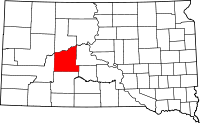Haakon County, South Dakota
| Haakon County, South Dakota | |
|---|---|

Haakon County Courthouse in Philip
|
|
 Location in the U.S. state of South Dakota |
|
 South Dakota's location in the U.S. |
|
| Founded | 1915 |
| Named for | Haakon VII |
| Seat | Philip |
| Largest city | Philip |
| Area | |
| • Total | 1,827 sq mi (4,732 km2) |
| • Land | 1,811 sq mi (4,690 km2) |
| • Water | 16 sq mi (41 km2), 0.9% |
| Population (est.) | |
| • (2016) | 1,892 |
| • Density | 1.1/sq mi (0/km²) |
| Time zone | Mountain: UTC-7/-6 |
Haakon County is a county located in the U.S. state of South Dakota. As of the 2010 census, the population was 1,937. Its county seat is Philip.
The county was created in 1914 and organized in 1915, and was formed from the original counties of Nowlin and most of Sterling, which had previously been absorbed by Stanley County. It is named for Haakon VII, who became king of Norway in 1905. It is the only county in South Dakota named for a non-American person and is one of only nine counties in South Dakota named for persons who did not live in South Dakota (Clay, Custer, Douglas, Grant, Hamlin, Lincoln, McPherson, and Meade are the other eight). Most of the 66 South Dakota counties are named for early South Dakota officials or legislators, or for physical features (Fall River and Lake), or are derived from Indian words (Minnehaha and Yankton), or from counties in other states (Jones and Walworth), with one (Aurora) named for a Roman goddess, one for an animal (Buffalo), and one (Union) for a concept.
...
Wikipedia
